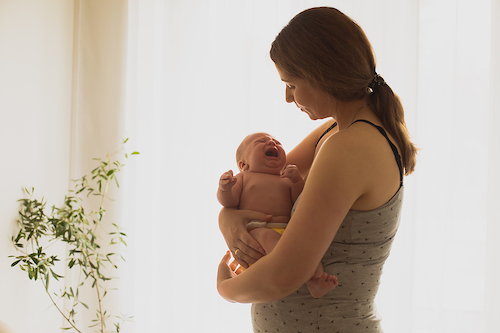 Women at increased risk of postpartum psychosis show altered connectivity in networks of the brain responsible for planning, organisation and the completion of short and long-term tasks.
Women at increased risk of postpartum psychosis show altered connectivity in networks of the brain responsible for planning, organisation and the completion of short and long-term tasks.
Postpartum psychosis is a rare disorder affecting around one in every thousand women who have a baby.
Currently, there are no biological markers that identify who will develop postpartum psychosis. But researchers from King’s College London have identified altered connectivity in the brain networks of women with postpartum psychosis, which could pave the way for better identifying women at risk of the condition.
“In my clinical work as a perinatal psychiatrist, I look after women who are at risk of, or who have postpartum psychosis. This study was inspired by the need I feel to be able to tell these women more about the risk they carry, and to try and understand which ones are at a very high risk of developing an episode of postpartum psychosis after giving birth,” Paolo Dazzan, author of the study and a Professor of Neurobiology of Psychosis at King's College London told Theravive.
“This is why the study is important: although the disorder is rare (it affects only one in every 1,000 women who have a baby), it is much more common in those women with a history of bipolar disorder or schizoaffective disorder (a condition which has symptoms of schizophrenia and bipolar disorder), or women who have suffered a previous episode of postpartum psychosis. Still, there are currently no biological markers that can help us identify which women could go on to develop postpartum psychosis. It is important we do more research to identify these markers.”
In undertaking the research, Dazzan and colleagues followed 32 women believed to be at risk of postpartum psychosis, along with 27 women believed not to be at risk from the condition from pregnancy until eight weeks following birth.
Those who were considered at risk of postpartum psychosis had a diagnosis of either bipolar or schizoaffective disorder, or had previously experienced postpartum psychosis.
Four weeks following birth, 15 women experienced symptoms that were indicative of postpartum psychosis.
At eight weeks following birth, the women were given brain scans whilst at rest, then given brain scans during a task that required emotional processing. This task involved looking at pictures of faces displaying different emotions and being asked to identify the emotion.
The women were measured to see how long it took them to identify the emotion displayed on the faces, and the scans were analysed to see which brain networks were activated during the task.
The researchers found that every woman who was believed to be at risk of postpartum psychosis, and the women who experienced symptoms of postpartum psychosis, had trouble identifying emotional expressions that were negative when compared with their healthy peers. These women had longer reaction times to images that showed negative emotions, and displayed reduced connectivity in certain brain networks on the scans.
“We found that, compared with healthy women, women at risk of postpartum psychosis show altered connectivity in brain networks associated with ‘goal-directed behaviour’ – i.e. areas of the brain involved in planning, organising and completing short and long-term tasks,” Dazzan said.
“We also found that increased connectivity within the brain’s executive network (responsible for attention, working memory and decision-making) could represent a marker of resilience to postpartum psychosis relapse.”
Similar changes in brain connectivity have also been found in patients with other psychiatric conditions. The researchers say these changes were obvious in the women who displayed symptoms of postpartum psychosis. They say this could be indicative of the emotional instability that can be experienced during postpartum psychosis.
Up until now, it has been difficult for clinicians to identify women who are at risk of developing postpartum psychosis. It has also been challenging to explain why some women are more vulnerable to developing the condition than others.
This study is the first of its kind to provide an improved understanding of the role of brain connectivity in postpartum psychosis.
“The brain scans are helping us understand what factors indicate a vulnerability in certain women. If subtle alterations in the brain’s executive network, and its interaction with other brain areas, were also detectable in pregnancy, these could offer vital clues to the development of postpartum psychosis. Potentially, this could enable us to intervene earlier, allowing clinicians to provide the best possible support for new mothers, before the onset of symptoms.”
Elizabeth Pratt is a medical journalist and producer. Her work has appeared on Healthline, The Huffington Post, Fox News, The Australian Broadcasting Corporation, The Sydney Morning Herald, News.com.au, Escape, The Cusp and Skyscanner. You can read more of her articles here. Or learn more about Elizabeth and contact her via her LinkedIn and Twitter profiles.